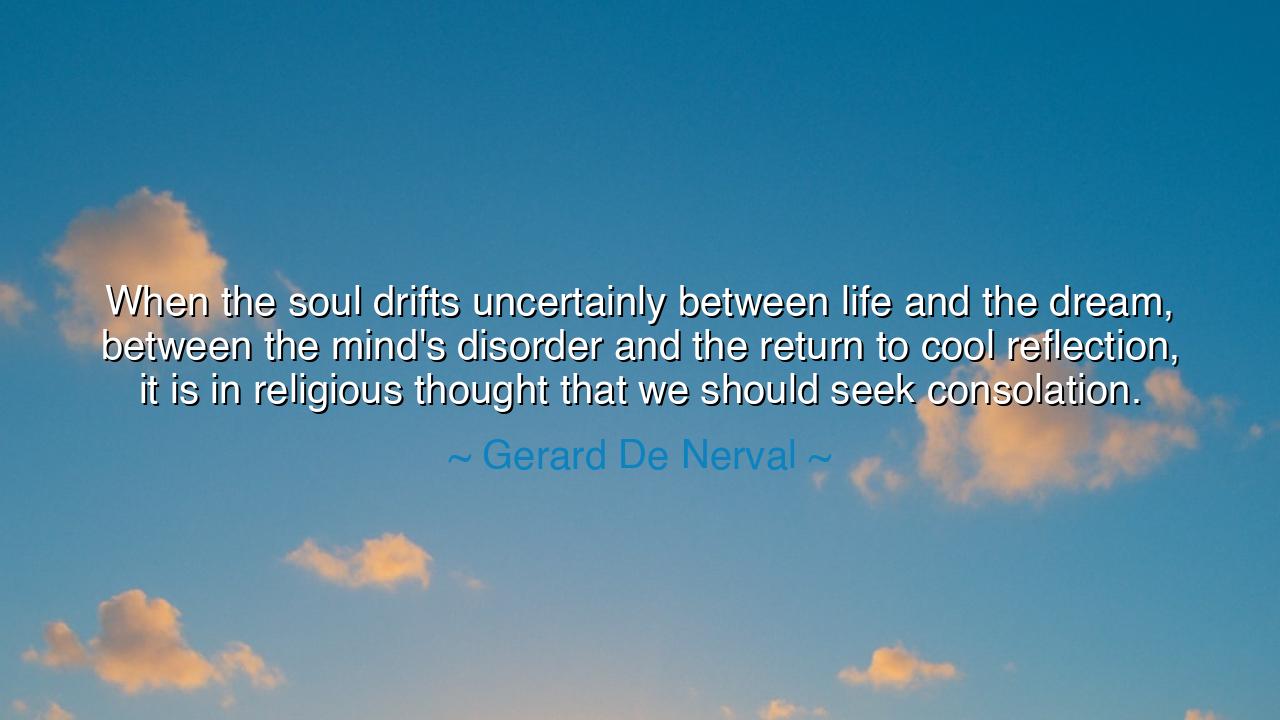
When the soul drifts uncertainly between life and the dream
When the soul drifts uncertainly between life and the dream, between the mind's disorder and the return to cool reflection, it is in religious thought that we should seek consolation.






"When the soul drifts uncertainly between life and the dream, between the mind's disorder and the return to cool reflection, it is in religious thought that we should seek consolation." These profound words by Gerard De Nerval speak to the eternal human struggle of navigating the space between the chaos of the mind and the peace that we often long for. The soul, adrift in uncertainty, finds itself torn between the vivid dreams of the subconscious and the harsh reality of the waking world. In this state of turmoil, De Nerval suggests that it is in religious thought, in the spiritual, that we can find solace—a sanctuary that brings the mind back to calm reflection and clarity.
The ancients understood the importance of the soul's journey between worlds—whether in dreams, thought, or prayer. Plato famously spoke of the soul’s search for truth, a journey that often required a descent into the depths of the subconscious to reconcile the soul’s confusion. In Plato's Phaedo, the philosopher describes the soul’s transition between the world of the senses and the world of eternal truths. The struggle to find clarity and understanding amid life’s uncertainties was seen as both a personal and cosmic endeavor. Plato taught that through the pursuit of wisdom and the practice of philosophy, one could find the light that guided the soul through confusion and into a state of peace. Religion, for the ancients, was not merely a system of belief but a guide to the soul’s rightful path toward balance and truth.
De Nerval’s words also evoke the idea of the soul's turbulence, which often arises when it is torn between conflicting forces: the disorder of daily life and the longing for inner peace, the temptation of fleeting pleasures and the pursuit of enduring truths. Such a battle is familiar to many, especially in times of uncertainty or confusion. In ancient mythology, we see this inner conflict reflected in the stories of gods and mortals. The Greek myth of Orpheus, whose music could soothe even the hardest of hearts, illustrates the soul’s struggle to find harmony amid suffering. When Orpheus lost his wife Eurydice a second time, after failing to follow the gods’ command, he found himself adrift between despair and the possibility of redemption. His soul, like many, was torn between the chaos of grief and the hope that through devotion and reflection, he might find peace once more.
The role of religious thought as a guide for the soul can also be seen in the stories of Buddhist monks, who seek to bring peace to their minds through meditation and reflection. The very act of meditation—to sit in stillness, to empty the mind of its clutter—serves as a powerful tool to confront the dissonance between the world of dreams and the world of reality. In the practice of mindfulness, a key aspect of Buddhist thought, individuals are taught to return to the present moment, to reflect with clarity, and to find consolation in the simplicity of the now. Through this process, the soul can achieve harmony, moving away from the turbulence of mental disorder and toward the calm reflection that De Nerval speaks of.
In the life of the great saint Augustine of Hippo, we see a similar journey. In his Confessions, Augustine writes of his struggle between the pleasures of the world and the desire for spiritual peace. His search for truth was long and arduous, marked by a deep sense of disorder within his soul. Yet, it was in his conversion to Christianity, in religious thought and the embrace of the faith, that Augustine found the consolation and inner peace he had been seeking. Faith, for Augustine, was the bridge between the chaos of human desire and the calm reflection of divine truth—a reflection of De Nerval’s assertion that in religious thought, the soul finds its grounding.
The lesson here is both profound and practical: when the soul drifts uncertainly, when the mind is overwhelmed with disarray, the path toward consolation lies not in further dissection or reasoning, but in seeking spiritual grounding. Religion, in its truest form, offers more than doctrine or ritual—it provides a safe haven, a place where the soul can rest from its inner conflict. Meditation, prayer, or reflection can serve as ways to restore balance, to quiet the mind, and to help the soul return to its rightful place. In these moments, we are reminded that true clarity comes not from intellectual understanding alone, but from a deeper, spiritual connection that transcends the fleeting uncertainties of daily life.
Thus, we are called to cultivate peace within ourselves, to seek that space of calm where reflection and spirituality can guide us through times of confusion. Just as the ancient philosophers sought wisdom and the Buddhists sought mindfulness, so too must we look inward when the world outside becomes too loud, too chaotic. It is in these moments of stillness that we find the strength to move forward—guided by the wisdom of the ancients and the spiritual thought that has always had the power to restore the soul to its proper course.






AAdministratorAdministrator
Welcome, honored guests. Please leave a comment, we will respond soon